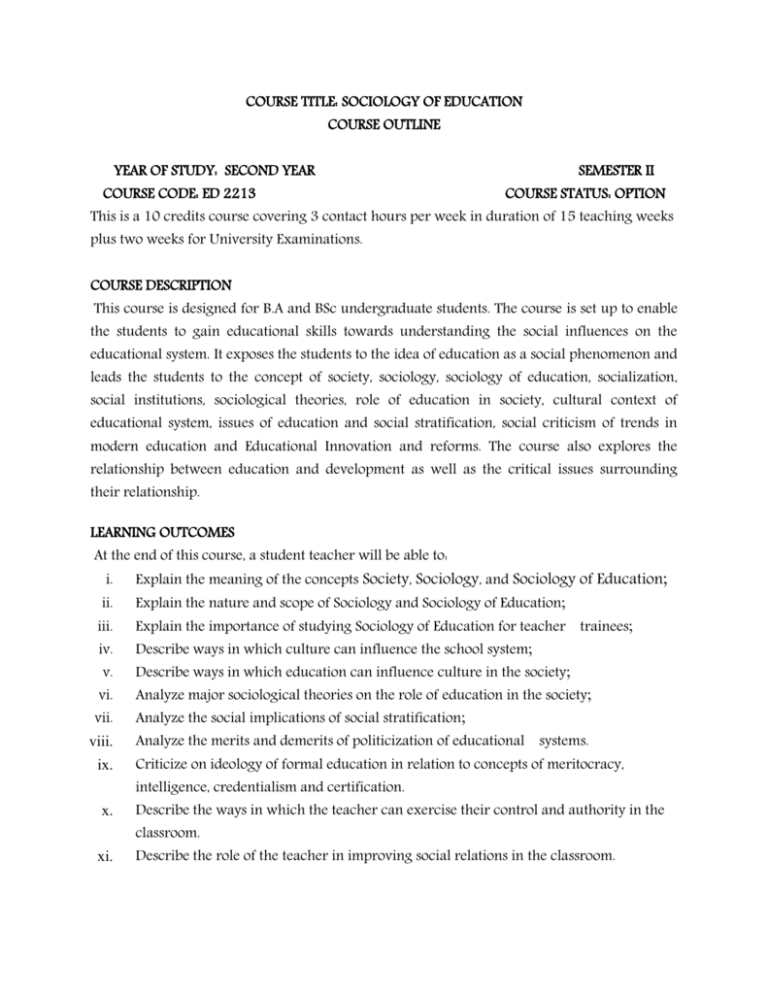COURSE TITLE: SOCIOLOGY OF EDUCATION COURSE OUTLINE
advertisement

COURSE TITLE: SOCIOLOGY OF EDUCATION COURSE OUTLINE YEAR OF STUDY: SECOND YEAR COURSE CODE: ED 2213 SEMESTER II COURSE STATUS: OPTION This is a 10 credits course covering 3 contact hours per week in duration of 15 teaching weeks plus two weeks for University Examinations. COURSE DESCRIPTION This course is designed for B.A and BSc undergraduate students. The course is set up to enable the students to gain educational skills towards understanding the social influences on the educational system. It exposes the students to the idea of education as a social phenomenon and leads the students to the concept of society, sociology, sociology of education, socialization, social institutions, sociological theories, role of education in society, cultural context of educational system, issues of education and social stratification, social criticism of trends in modern education and Educational Innovation and reforms. The course also explores the relationship between education and development as well as the critical issues surrounding their relationship. LEARNING OUTCOMES At the end of this course, a student teacher will be able to: i. Explain the meaning of the concepts Society, Sociology, and Sociology of Education; ii. Explain the nature and scope of Sociology and Sociology of Education; iii. Explain the importance of studying Sociology of Education for teacher trainees; iv. Describe ways in which culture can influence the school system; v. Describe ways in which education can influence culture in the society; vi. Analyze major sociological theories on the role of education in the society; viii. Analyze the merits and demerits of politicization of educational systems. vii. ix. Analyze the social implications of social stratification; Criticize on ideology of formal education in relation to concepts of meritocracy, intelligence, credentialism and certification. x. Describe the ways in which the teacher can exercise their control and authority in the classroom. xi. Describe the role of the teacher in improving social relations in the classroom. xii. Evaluate the major educational innovations andreforms which have been taking place in Tanzania since 1964. xiii. Analyze the Social Criticism of Trends in Modern Education according to various educationists /philosophers. xiv. Analyze critical issues surrounding Education and development. COURSE CONTENT Week 1 (3 hours): An Overview of Sociology of Education Definitions of sociology, society and sociology of education. Branches of Sociology. Nature and scope of Sociology and Sociology of Education. Importance of studying Sociology of Education for teachers Week 2-3 (6 hours): Culture and Cultural Context of Educational System Meaning and elements of culture. Influence of Culture on Educational system and vice versa Educational access and gender The cultural dynamism of school system and language. Week 4-5 (6 hours): Sociological Perspectives and the Role of Education in Society Functionalism Marxism Symbolic Interactionism Week 6-7 (6 hours): Education and Social Stratification Meaning of Social Stratification Agents of Social Stratification - The Family - The School - Occupation Social Class and Educational Attainment Social mobility Educational Implications of Social Stratification Week 8 (3 hours): Politicization of Educational Systems Meaning of politics and politicization of educational systems. Merits and demerits of politicization of educational systems. Week 9-10 (6 hours): Ideology of formal education on issues of meritocracy, intelligence, credentials and certification. Meaning of Intelligence Multiple Intelligence theory (Howard Gardner) Credentialism, and Certification in formal education Meritocracy and formal education (Ronald Dore , Ivan Illich) Week 11 (3 hours): The classroom and the teacher Legitimacy, authority, credibility and control Social relations in the classroom Week 12 (3 hours): Innovation and Reforms in education Meaning of Innovation and Reforms in education Importance of Educational Innovation and Reforms for societal development Educational Innovation and Reforms in Tanzania Week 13-14 (6 hours): The Social Criticism of Trends in Modern Education Mahatma Gandhi , Paulo Freire , Julius Nyerere James Aggrey. Week 15 (3 hours): Education and social development Meaning of education and social development Interdependence between education and development Critical issues surrounding Education and development (Access, Quality and Equity) Week 16 & 17: University Examinations INSTRUCTIONAL METHODS Lecturing Discussions of case studies Seminar presentations Demonstrations ASSESSMENT METHODS: Course work 40%: - Presentation10 marks - Take home 10 marks - Test 20 marks Final Examination 60% READING LIST Banks, O (1976). The Sociology of Education. Batsford Ltd: London Burgess, R.G (1986). Sociology, Education and Schools: An Introduction to Sociology of Education.B.T.Batsford Ltd. Great Britain Cohen, R. & Kennedy, P. (2000).Global Sociology. New York University Press: New York Ezewu, E (1983). Sociology of Education. Longman Group (FE) Ltd: London Goldthorpe, J. E. (1974). An Introduction to Sociology (2nd edition).Cambridge University Press: London. Ishumi, A.G.(1974). A Review of Concepts, Ideas and Practices. Institute of Education: Dar es Salaam. O’Donnell, M.(1997).Introduction to Sociology (4th edition).Thomas Nelson London. and Sons Ltd: Seltiz, J et al ( 1985). ”Research Methods in Social Relations”. Papers in Education and Development. Paper No.10 Useful websites: www.tandf.co.uk/journals/authors/cbseauth.asp www.s-cool.co.uk









